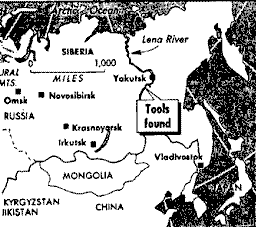 |
Science Frontiers ONLINE No. 92: Mar-Apr 1994 |
|
|
Did humans evolve in siberia?

|
"Molchanov's controversial evidence is indeed striking: a collection of chipped and flaked rocks that are clearly artifacts fashioned by humanlike hands and that he contends are 2.5 million years old -- plus or minus a half-million years.
"Remarkably, that same era marked the time when early human ancestors known as Homo habilis lived and left their remains in the tropical Olduvai Gorge of what is now Tanzania. Mochanov's collection of tools closely resembles the ones that anthropologists have long collected from digs in Africa."
All this contrasts strongly with the dominant view of hominid evolution, which cites warm, verdant African forests and savannas as our most likely place of origin. Siberia, with its -50� winters and fleeting summers, hardly seems conducive to hominid speciation. Mochanov's rationale is that this severe climate actually stimulated ancient hominids to create tools, fashion warm clothing, and build winter shelters -- these Siberian hominids had to evolve or perish!
In addition to the climate factor are two other problems: (1) The Siberian sites have yielded no hominid bones nor have animal bones of any kind been found; and (2) The dating of the tools is shaky. They cannot be radiometrically dated. Instead, Mochanov has had to rely on the tools' similarity to African tools of 2 million years ago, magnetostratigraphy, the decayed luminescence of the soil, and the ages of the strata in the 450-foot gorge of the Lena River. It goes without saying that other anthropologists are reserving judgment.
Nevertheless, Mochanov's Siberian discoveries have produced a magnitude-8 tremor in science.
(Perlman, David; "Russian Scientist Says Homo sapiens Has Arctic Origins," San Francisco Chronicle, January 17, 1994. Cr. J. Covey. A short summary of Mochanov's research appeared in: Stone, Richard; "Turning Out-of-Africa Inside Out," Science, 262:1963, 1993.)
Comment. It is odd that some other archeological sites with apparently very ancient tools, such as that at Calico Hills, California, are also devoid of hominid bones and radiometrically datable artifacts. A similar situation prevails at many North American epigraphic sites, where someone wrote copiously in ancient symbols but left little else to betray their identities.